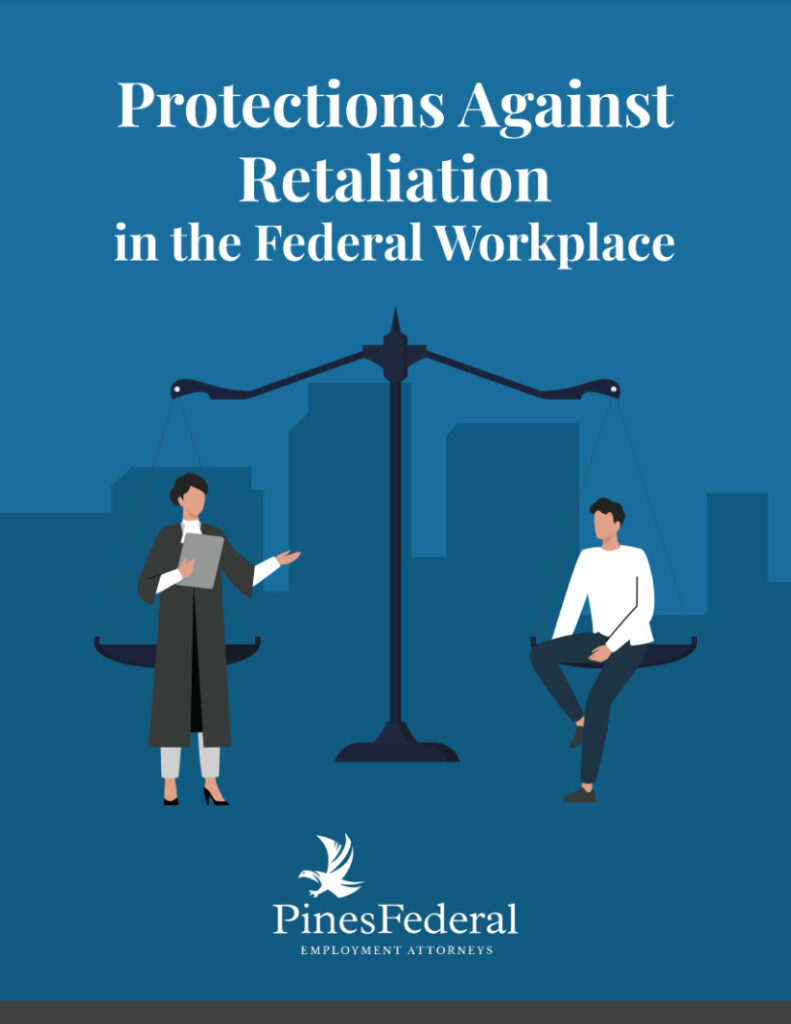We Represent Clients Against Employer Retaliation
Federal whistleblowers who call attention to the mismanagement of national programs and waste of taxpayer resources do our nation a great service.
The higher-ups overseeing government agencies may, whether purposefully or through negligence, contribute to unfair treatment of our citizens.
Our federal government is here to provide support for those who need it, not to contribute to their suffering.
We rely on patriotic advocates to bring these abuses to light, and at Pines Federal, our federal whistleblower retaliation lawyers team is dedicated to helping them fight back against employer retaliation.
Learn how we can assist you by calling (800) 801-0598 or filling out our online form today.
What is a Whistleblower?
A whistleblower is “an employee who brings wrongdoing by an employer or by other employees to the attention of a government or law enforcement agency.”
Many different laws grant whistleblowers protection from discrimination and harassment. Two examples are Title VII of the Civil Rights Act of 1964 and the Whistleblower Protection Act.
What is the Whistleblower Protection Act?
Congress passed the Whistleblower Protection Act (WPA) in 1989 to protect government employees who disclose information relating to ethical and legal violations.
Specifically, the WPA protects anyone who makes discloses information indicating:
- A violation of law, rules, or regulations;
- Mismanagement;
- Gross waste of funds;
- Abuse of Authority; or
- A substantial and specific danger to public health and safety.
Although retaliation against whistleblowers is unlawful, it continues to be a problem in the federal workplace. Countless would-be whistleblowers stay silent because of fear of reprisal.
However, a qualified federal whistleblower retaliation lawyer can help defend your rights against retaliation.
Know Your Rights: Federal Whistleblower Protections
Any government employee who discloses “illegality, waste, and corruption” within administration operations must not face retaliation, as laid out by the Whistleblower Protection Act.
In 2002, the No FEAR Act was passed to discipline individuals who retaliated against whistleblowers or illegally discriminated against any worker. Unfortunately, problems continued to rein across agencies.
The VA Accountability and Whistleblower Protection Act, signed in 2017, created the Office of Accountability and Whistleblower Protection (OAWP) to investigate or refer reports of wrongdoing, monitor changes advised by oversight organizations, and intercede in issues of retaliation in the Department of Veterans Affairs (VA).
Is this latest anti-corruption initiative living up to its promises?
Whistleblower Safety Depends on Enforcement
The OAWP was created with good intentions in mind, but in practice, the office has let down whistleblowers by botching investigations and failing to keep whistleblowers anonymous when forwarding complaints to their managers or offices.
Though the OAWP has undergone leadership changes and vowed to fix these problems, the agency’s troubled past may cast doubt on their ability to protect the officials who count on them to handle complaints in a fair and discreet manner.
Additionally, some federal employees who used OAWP to report issues faced unfair consequences. If you have suffered from retaliation after disclosing information, it is best to consult a federal whistleblower defense attorney.
The OAWP Isn’t Doing Its Job
Many brave individuals came forward with documentation of the very transgressions the OWAP was created to protect but saw no change in workplace operations.
Such issues include:
- Disregard for rules or regulations,
- Misspent funds,
- Poor treatment of employees, and
- Potential for widespread harm.
The OAWP was tasked with investigating reports on the above or referring them to another agency, depending on the scope of the allegations.
Its employees were also supposed to personally monitor reports of retaliation after a complaint. However, under their watch, investigative resources have often gone toward tracking whistleblowers rather than looking into the issues they brought forward.
The OAWP’s botched operations were so serious that they attracted congressional attention. In June 2018, multiple US senators and representatives requested that the VA Office of Inspector General investigate the OAWP.
The investigation focused on resolving various issues, including:
- Whether the OAWP was conducting adequate and fair investigations;
- Whether the OAWP was exercising its authority properly; and
- Whether the OAWP was appropriately protecting whistleblowers from retaliation.
The investigation concluded that the OAWP had “significant” deficiencies and flaws. Among other things, the report found that the OAWP’s investigations were “disciplinary actions[s] [against whistleblowers] in search of evidence.”
It also found that the OAWP regularly failed to protect whistleblowers and “took actions that reflected a lack of respect” for many whistleblowers.
Because the OAWP has clearly failed its mission, it is left to individuals to hire their own VA whistleblower lawyer and seek justice.
What Retaliation Looks Like
When whistleblowers face consequences for documenting wrongdoings, it’s not always in the form of a firing notice, and their part in bringing certain concerns to light likely isn’t mentioned at all.
That doesn’t mean disciplinary actions aren’t related to the fact that an employee has blown the whistle.
Most managers likely know enough to understand that mentioning the complaint as a cause of this action would be overtly illegal. Instead, they find other ways to retaliate.
Examples from the OAWP include the following:
- A VA executive was investigated five times and threatened with suspension and firing over made-up problems.
- OAWP employees have been excluded from meetings and asked to resubmit resumes despite already holding a position with the agency.
- A former doctor faced a hostile environment at work after reporting an issue to her supervisor and was forced to resign.
- A technician received a verbal reprimand and was reassigned multiple times.
- An engineer was stripped of his duties and relocated to a different office.
- A physician was removed from the care network and given administrative work.
If you have faced negative changes in your work environment or job duties after blowing the whistle, you may be facing employer retaliation.
You have the right to legal recourse against anyone who attempts to punish you for bringing your concerns to light.
[DOWNLOAD] Protections Against Retaliation in the Federal Workplace

Why Should I Hire a VA Whistleblower Retaliation Attorney?
Hiring an attorney provides you with a vast array of benefits. Let’s look at these benefits in more detail.
Case Evaluation
The first benefit of an attorney is that they will be able to evaluate your case. Because the laws around whistleblowing are complex, it is very difficult for non-attorneys to understand their chances of success.
In addition, whistleblowers tend to have a deep emotional connection to their activities. This makes it difficult for them to assess their legal options objectively.
However, as legal professionals, attorneys can apply the law to the facts of your situation. They can then evaluate possible outcomes. Finally, your attorney can present potential legal options, along with each option’s risks and benefits.
Assistance with Your Claim
If you decide to go forward with a whistleblower retaliation lawsuit, your attorney will file your lawsuit in federal court.
In addition, an attorney can articulate specific claims and the evidence you have that backs up your allegations. These actions help maximize your chances of a favorable result while allowing you to focus on living your life.
Once your lawsuit is underway, your attorney will make every effort to collect favorable evidence. Through discovery and other methods, your attorney can identify supporting witnesses and documentary evidence that establishes your claims.
At the same time, your attorney will represent your interests before with your employer and other parties. On top of all that, your attorney can work to negotiate a fair settlement to get you the compensation you deserve.
Identity Protection
Not all whistleblower cases allow you to remain anonymous. However, a skilled whistleblower retaliation attorney can take every legal measure possible to protect your identity against disclosure.
And if your employer discovers your identity and retaliates against you, your attorney will intervene on your behalf.
We Help You Fight Employer Retaliation
After you decide to hire a whistleblower attorney, you need to be intentional about which lawyer you hire. Not all attorneys are the same.
Instead, you want to keep an eye out for attorneys with significant experience and a proven track record of success. Moreover, you need to find an attorney with a good reputation who is experienced with retaliation claims.
Our team at Pines Federal cares about supporting veterans—and about protecting the brave employees who come forward to report mismanagement in the VA and beyond.
If you’ve made a report within your office or to the OAWP and suspect retaliation, you are not alone. Come share your story with our legal team.
With over 20 years of trying federal employment law cases, our reputation has spread nationwide. From our offices in Houston, Atlanta, and Pikesville, we are ready to serve you, no matter where you are in America.
VA mismanagement has harmed too many veterans, and often the leaders behind these problems punish the employees who speak up for our vets.
We’re fighting to help anyone targeted with disciplinary actions after they made an official complaint.
Please don’t hesitate to contact us online or call (800) 801-0598 today for a consultation with our federal whistleblower lawyers.





